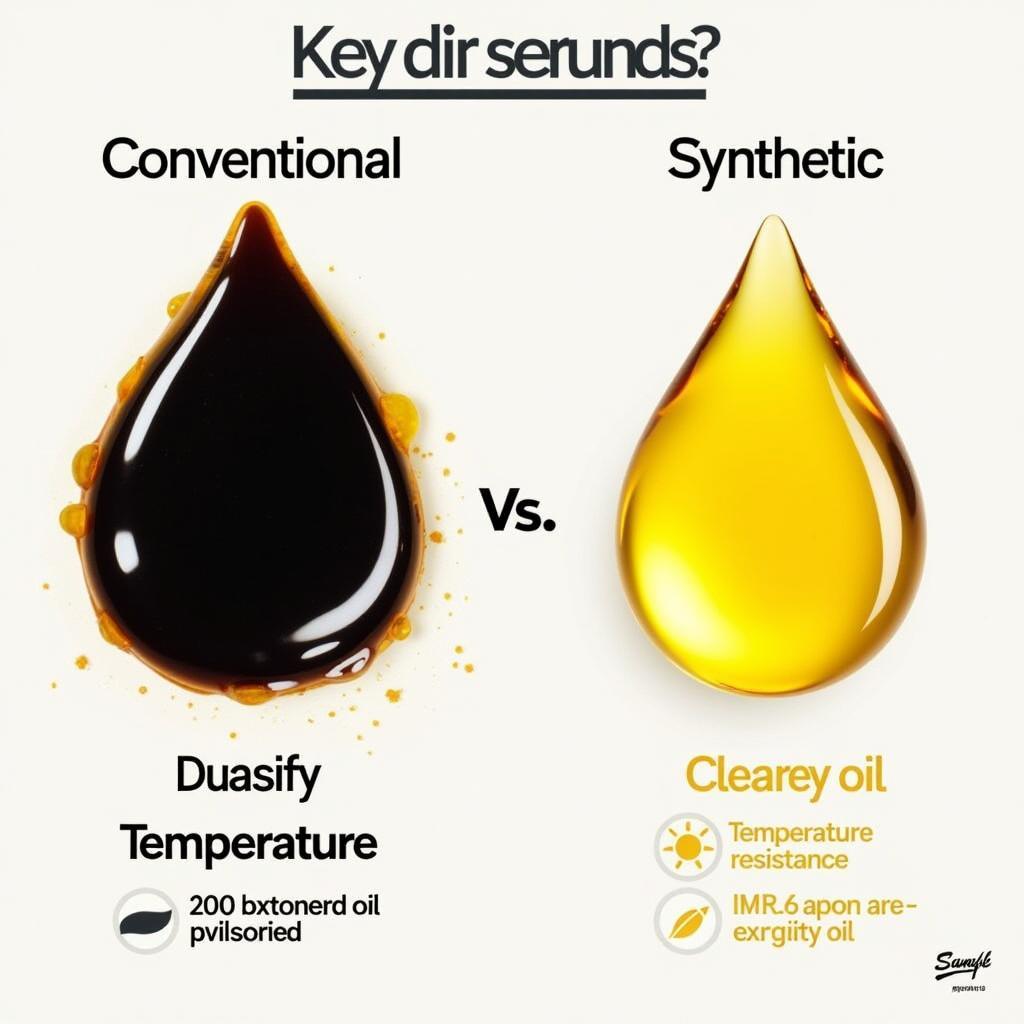Using normal oil in a car that requires synthetic can lead to serious engine problems. This article will delve into the reasons why using the incorrect oil type can be detrimental to your vehicle’s health, explaining the differences between conventional and synthetic oil, and outlining the potential consequences of using the wrong one. We’ll also offer practical advice on how to choose the correct oil and maintain your engine for optimal performance.
Understanding the Difference: Conventional vs. Synthetic Oil
Choosing the right motor oil isn’t just about picking a brand; it’s about selecting the right type of oil for your engine. Conventional oil is derived from crude oil, refined, and enhanced with additives. Synthetic oil, on the other hand, is engineered from synthesized chemical compounds, offering superior performance and protection in demanding conditions. This engineered nature allows for tighter molecular control, resulting in improved viscosity, resistance to breakdown, and better overall engine protection.
So, what happens when you use regular oil in a synthetic recommended car? The short answer is, you risk compromising your engine’s performance and longevity.
Problems Using Normal Oil in Synthetic Recommended Cars: The Risks
Using the wrong oil can create a domino effect of issues within your engine. The tighter tolerances in modern engines, particularly those designed for synthetic oil, require the oil’s specific properties for optimal lubrication. Conventional oil, lacking these properties, can lead to increased friction and wear, especially under high temperatures and stress.
- Increased Engine Wear: Conventional oil breaks down faster than synthetic oil under high temperatures. This breakdown leads to the formation of sludge and deposits, which can clog oil passages and increase friction, leading to accelerated engine wear.
- Reduced Fuel Efficiency: Thicker conventional oil creates more resistance within the engine, reducing fuel efficiency. Synthetic oil’s superior flow characteristics contribute to better mileage.
- Performance Issues: Using the incorrect oil can lead to decreased engine performance, including sluggish acceleration and reduced power output.
- Voiding Warranty: Many manufacturers stipulate the use of synthetic oil in their warranties. Using conventional oil could void your warranty if engine problems arise.
- Increased Maintenance Costs: The accelerated wear and tear resulting from using the wrong oil can lead to more frequent oil changes, repairs, and ultimately, a shorter engine lifespan, increasing overall maintenance costs.
 Comparing Conventional and Synthetic Motor Oil: Key Differences and Benefits
Comparing Conventional and Synthetic Motor Oil: Key Differences and Benefits
Why Some Cars Specifically Recommend Synthetic Oil
Modern engines are designed with tighter tolerances and operate at higher temperatures. Synthetic oil is specifically formulated to handle these demands, providing superior protection and performance under extreme conditions. Using conventional oil in these engines can lead to premature wear and tear. Think of it like using regular gasoline in a high-performance engine designed for premium fuel – you’re not maximizing the engine’s potential and risking damage.
What to Do If You’ve Accidentally Used Regular Oil
If you’ve accidentally put conventional oil in your car that requires synthetic, don’t panic. While it’s not ideal for extended periods, a single instance won’t necessarily cause catastrophic damage. It’s recommended to have the oil changed to the correct synthetic grade as soon as possible to minimize any potential long-term effects.
How to Choose the Right Oil for Your Car
Choosing the correct oil is crucial for maintaining your engine’s health. The best way to determine the right type of oil is to consult your owner’s manual. The manual will specify the recommended oil viscosity and type (conventional, synthetic blend, or full synthetic).
Expert Insights
“Using the correct oil is the single most important thing you can do to protect your engine,” says Michael Johnson, Automotive Engineer at Performance Auto Solutions. “Choosing the wrong oil is like using the wrong tool for the job. It simply won’t perform as intended and can lead to costly problems down the road.”
“Regular oil in a synthetic-recommended engine is a recipe for disaster,” adds Sarah Chen, Lead Mechanic at Precision Automotive. “The increased friction and heat can significantly reduce engine life and performance.”
Conclusion
Problems Using Normal Oil In Synthetic Recommended Cars can be significant, impacting everything from engine performance to longevity. Understanding the difference between conventional and synthetic oil is crucial for every car owner. Always refer to your owner’s manual to determine the correct oil for your vehicle. By using the correct oil, you can ensure optimal engine performance, maximize fuel efficiency, and extend the life of your car.
Need help choosing the right oil or scheduling an oil change? Contact AutoTipPro at +1 (641) 206-8880 or visit our office at 500 N St Mary’s St, San Antonio, TX 78205, United States.






Leave a Reply